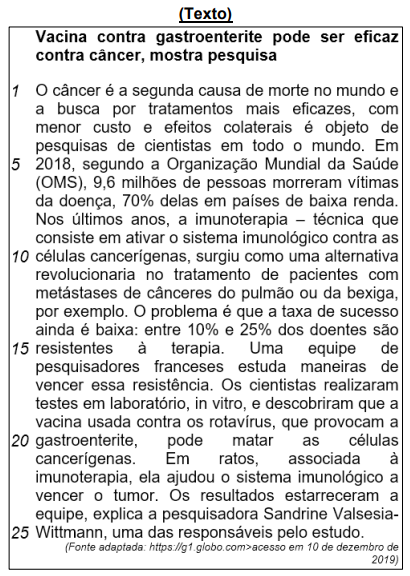Questões de Concurso Público Prefeitura de Paraíso - SC 2019 para Professor de Inglês
Foram encontradas 20 questões
(__) - Devem ter base nacional comum com padronização curricular em todos os sistemas de ensino e estabelecimentos escolares;
(__) - A partir do sexto ano do ensino fundamental será ofertada a língua inglesa;
(__) - A integralização curricular poderá incluir, a critério dos sistemas de ensino, projetos e pesquisas envolvendo temas transversais;
(__) - A exibição de filmes de produção nacional constituirá componente curricular complementar integrado à proposta pedagógica da escola, sendo a sua exibição obrigatória por, no mínimo, 2 horas semanais.
A partir da análise, pode-se dizer que a alternativa que expressa a sequência correta é:
I. Trata-se de um controle externo do aluno por meio de notas e conceitos, com objetivos pontuais e específicos.
II. Deve ter o papel de alimentar, sustentar e orientar a ação pedagógica e não apenas constatar certo nível do aluno.
III. Deve ser contínua e sistemática, como foco em uma interpretação quantitativa do conhecimento construído.
IV. São informações para colaborar nas decisões a serem tomadas a respeito de conteúdo, métodos e objetivos de ensino.
Sobre os itens acima, podemos afirmar que:
“A serious problem has ________.”
The right alternative to fill the blank is:
Considere the sentence below:
“Our classes begin at nine.”
The verb tense is:
É correto afirmar que o pronome “ela” retoma o seguinte termo:
Os Kaingang estão entre os mais numerosos povos indígenas do Brasil. No estado de Santa Catarina, uma das áreas indígenas que abriga os Kaingang é denominada Aldeia Kondá, que se localiza no município de:
A lacuna se refere a:
A partícula “que” introduz uma:
É correto afirmar que a partícula “que” exerce função morfológica de:

